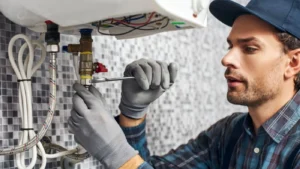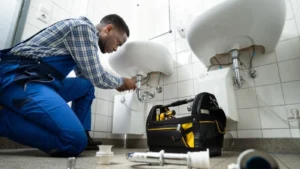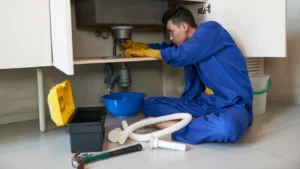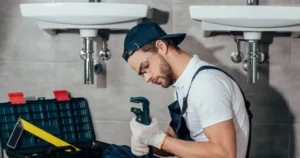
Want to see your potential revenue?
See what businesses like yours earn with Housecall Pro in 1 - 2 minutes.
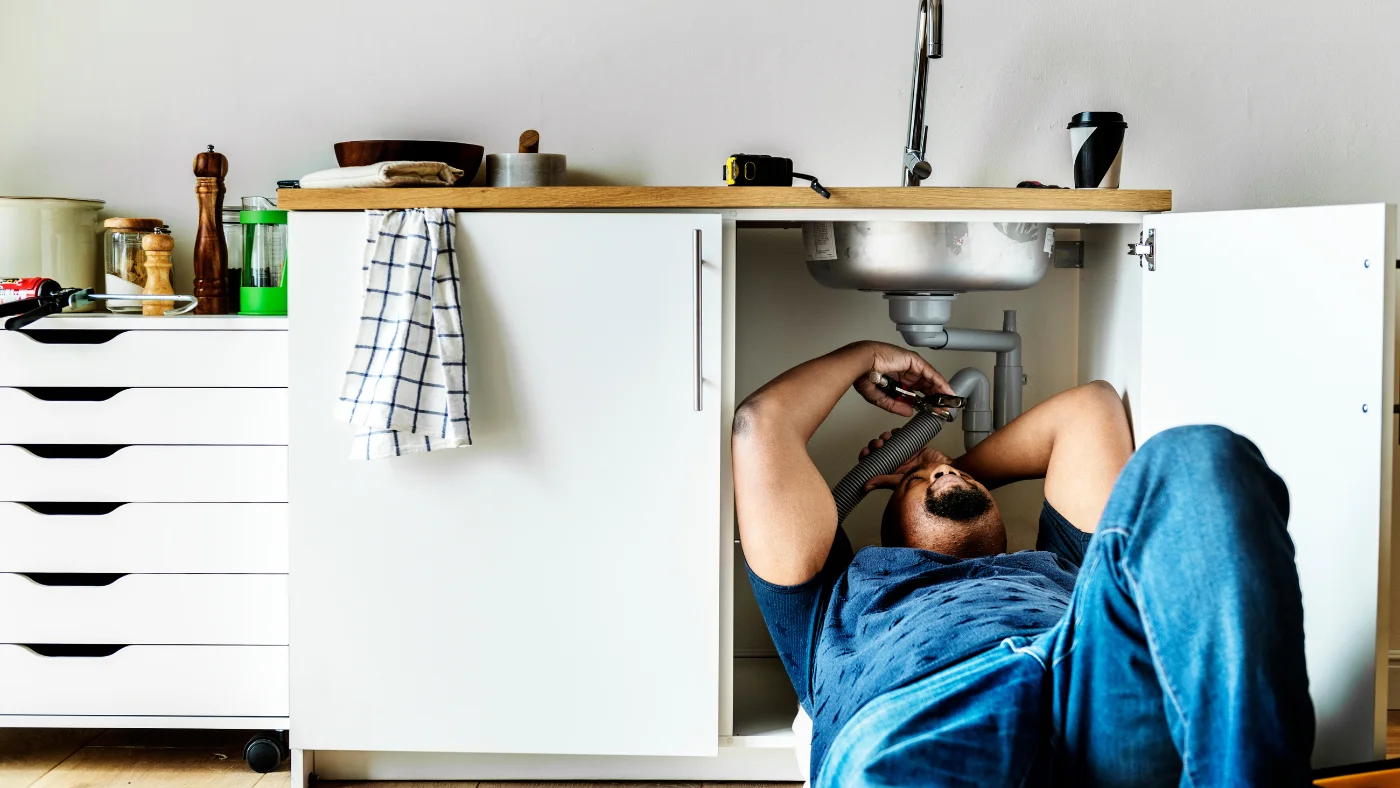
Who do your customers call when they need help, a plumber or a plumbing contractor? Knowing the difference between plumbing contractors and plumbers can help you, as a trade professional, properly market yourself online.
What is a Plumber?
A plumber is a trade worker who completes tasks related to water and sewer systems. They may handle emergencies, like a burst pipe or overflowing toilet, plus more routine tasks, like preventative maintenance of water and sewer pipes and fixtures.
When a homeowner or business owner needs service performed on their plumbing system or requires new fixtures to be installed, they typically call a plumber.
Plumbers usually start out as apprentices, then work their way up to a journeyman plumber and finally to a Master Plumber designation. Each rung on the ladder often requires different licensure and testing (both practical and book-based exams) before the individual can legally complete certain jobs or work without supervision.
What Does a Plumber Do?
A plumber completes repairs on a water or sewer system and can install new appliances and fixtures. Their job tasks are quite varied and include:
- Installing Plumbing Systems: This involves setting up pipes, fixtures (such as sinks, toilets, and bathtubs), and appliances (like washing machines and dishwashers) in both new construction and existing buildings.
- Repairing Plumbing Problems: Plumbers fix leaks, unclog drains, and address other issues within existing plumbing systems.
- Troubleshooting Malfunctioning Systems: They diagnose and identify the root cause of plumbing problems to determine the best course of action for repair.
- Maintaining Plumbing Systems: This involves regular inspections and preventative maintenance to keep plumbing systems functioning properly and prevent future problems.
- Installing and Maintaining Gas Lines: Many plumbers are also trained to work with gas lines, which can include installation, leak detection, and repair. **Note that in some states, this requires separate licensure.
- Maintaining Septic Systems: For properties not connected to a sewer system, plumbers may maintain and service septic tanks.
- Providing Emergency Services: Plumbers are often on call for emergencies like burst pipes, severe clogs, and broken water heaters.
- Reading Blueprints and Following Codes: They need to be able to understand technical drawings and ensure their work complies with state and local building codes.
- Estimating Costs: Plumbers prepare cost estimates for clients to outline the potential expense of plumbing work.
- Performing Administrative Tasks: This includes maintaining inventory, documenting work, and providing customer service.
Some plumbers specialize exclusively in residential or commercial jobs, while others work with customers across all building types. Other plumbers may specialize exclusively as industrial plumbers, working on large-scale projects for manufacturers and similar clients.
Is Plumbing a Trade Job?
Yes, plumbing is considered a skilled trade. It’s a field work job that requires specific training, licensure, and experience. Plumbers can choose to specialize their trade, obtaining licenses for specialty jobs and niche work, such as installing and repairing natural gas lines or fire protection and sprinkler system licensure.
Plumbing contracting is also a trade job, although there is often some crossover with plumbing contractors into “white collar” territory; plumbing contractors are licensed business owners who may supervise a team of tradespeople.
What is a Plumbing Contractor?
A plumbing contractor is a licensed professional permitted to complete more complex tasks than a plumber, including those that require a Master Plumber’s license. Plumbing contractors complete professional installations of water and sewer lines, plan these systems in new buildings and re-route these systems in a remodel or renovation job.
In easier terms, think of the plumbing contractor as the “planner” and the plumber as the “doer.” Most plumbing contractors are business owners with more employees than just themselves, and so there is a supervisory and managerial aspect to this job, as well as field work.
Property owners hire a plumbing contractor to complete professional installations of a building’s water and waste disposal system, backflow preventer, water heaters, gas connections, and natural gas lines. Contractors may also be responsible for installing fire and sprinkler systems in the building.
A plumbing contractor is also a consultant. They may collaborate with a general contractor on a project or directly with their client during the project’s development phase.
Plumbing contractors must ensure that all work is completed in accordance with state and local building codes and that any systems requiring a specific licensed professional for installation are installed by a licensed professional. For example, suppose a fire suppression system isn’t installed by someone licensed to do so and as per state code. In that case, the property owner’s insurance carrier may refuse to cover any damage to the building in the event of a fire. And, this also leaves the property owner and the contractor open to fines and legal trouble.
Just like plumbers, plumbing contractors may also specialize their business. Some contractors work exclusively on residential projects, either as independent contractors or with a general contractor, in a subcontractor role, while others may only accept commercial or industrial clients. You’ll also see plumbing contractors who work on each type of structure.
What Can a Plumbing Contractor Do?
As a consultant or subcontractor, a plumbing contractor works with clients during the planning stage of a project. They advise general contractors on what is and is not possible (both code-wise and in terms of feasibility) and complete the plumbing, gas, and fire suppression system installations for buildings.
In some states, plumbing business owners are required to hold a contractor’s license to employ staff.
Plumbing contractors are also expected to be experts on state and local building codes, as well as federal regulations for accessibility, such as ensuring that commercial plumbing systems comply with the Americans with Disabilities Act (ADA compliant).
Plumbing contractors engage in a wide range of plumbing-related tasks and have considerable responsibilities:
- Pre-Build Consult: Collaborate with architects, engineers, and inspectors to ensure plumbing plans comply with local, federal, and ADA codes for residential and commercial projects.
- Plumbing System Design and Installation: Create and install complex plumbing systems, ensuring all components function efficiently and are code-compliant.
- DWV System Construction and Design: Build drain, waste, and vent lines (DWV systems) as part of a home or building’s complete waste disposal system.
- Water Heater Installation, Upgrade, and Repair: Install, upgrade, or repair gas, electric, or tankless water heaters based on the property’s needs and utility setup. Plumbing contractors also convert a home or business from a traditional tanked water heater to a tankless water heater.
- Gas Connection and Flue Installation: Ensure code-compliant and safe gas line installation, including flue venting for combustion appliances.
- Water-Related Appliance Installation: Install gas control valves, backflow preventers, water softeners, conditioning systems, and other components that connect to the water supply.
- Repair Water Mains: Repair damaged water mains or replace damaged portions of water main lines throughout the system.
- Inspect Slabs for Leaks: Identify and repair hidden leaks under foundations and within gas lines (typically for residential customers).
- Conduct Final Plumbing Inspections: Ensure all work is completed to code and meets safety and quality standards for both new construction and renovations.
This list is by no means exhaustive; most licensed plumbing contractors can complete just about any type of plumbing work. However, some specialty tasks, such as fire suppression or working on natural gas lines, require a separate license (note that these requirements vary by state).
Plumbing Contractors as Business Owners
Many professional plumbers seek a contractor’s license because it’s required by their state to hire employees. Licensed plumbing contractors may focus more on operating their business and collaborating with potential clients than they do on completing field work themselves.
As a plumbing contractor business owner, your needs differ from those of a single-owner operator plumbing business. Luckily, Housecall Pro is scalable and grows as your business grows, making it easier to create complex quotes for new systems installations and manage multiple teams in the field.
Get In Touch: 858-842-5746
Let us earn your trust
On average, Pros increase monthly revenue generated through Housecall Pro by more than 35% after their first year.
See plan options and feature breakdown on our pricing page.
Is a Plumbing Contractor the Same as a Plumber?
Yes, in that all plumbing contractors started out as plumbers, but not every plumber is a plumbing contractor. Plumbing contractors have training and qualifications that ordinary plumbers don’t.
If a customer has an issue with a leaky toilet, burst pipe, or clogged commode, they’re probably googling, “Plumber near me.” A plumber is a licensed professional who works on water and sewer lines and repairs plumbing fixtures and appliances connected to water and sewer lines.
What if your customer wants to remodel their kitchen or bathroom and needs someone with more specialized skills (and the proper licensure, depending on their location) to complete the job? They’d call a plumbing contractor instead of a plumber. Unlike plumbers, contractors deal almost exclusively with new construction, renovations, and remodeling, including the planning and execution of tasks. They may also supervise crews of trained plumbers and journeymen to complete these larger, more involved jobs.
A plumbing contractor is a “big picture” professional responsible for the structural aspects of a residential or commercial building’s plumbing system. They are responsible for securing the correct permits for the residential, commercial, or industrial structure and ensuring that any installation they complete is code-compliant.
Contractors also review the proposed types of materials that a developer uses, making recommendations based on the proposed use of the structure and the volume of water and waste that will flow through the system. They may suggest changes to the plumbing system layout or materials to ensure better functionality.
Plumber Requirements
Each state sets its own licensing requirements for plumbers. Many have different levels of experience and certification:
Apprentice Plumber
Apprentices are typically enrolled in trade school, attending community college or university to pursue a degree in plumbing, or participating in a union-sponsored apprenticeship program while working full-time or part-time under the supervision of a journeyman or Master Plumber.
An apprenticeship can last from 2 to 6 years and usually combines classroom learning with fieldwork. Upon completing the requisite training, apprentices take an exam and apply for their journeyman plumber’s license.
Journeyman Plumber
A journeyman plumber is the next step from apprentice. Journeyman plumbers can complete basic plumbing work unsupervised, may supervise apprentices, and, in some states, may be able to operate their own owner-operated plumbing business. However, this is highly dependent on state regulations.
Journeyman plumbers, once they have completed the required training and education, can apply for a Master Plumber license, which opens up more career opportunities, allows them to hire employees, and is the next step toward obtaining a contractor license.
Master Plumber
Many states have an additional type of plumbing license, a Master Plumber. Master Plumbers can hire apprentices and journeymen, run their own businesses, and command higher wages if they work for themselves.
A Master Plumber may work as a Master Plumber for their entire career or choose to complete the testing and training requirements for a plumbing contractor license.
Plumbing Contractor Requirements
Plumbing contractors operate their own businesses and can bid on government jobs. Each state has its own requirements for a contracting license, including testing, experience, and continuing education.
In many states, contractors must meet certain financial requirements, as well, plus hold general liability insurance, a surety bond, and, if they have more than a certain number of employees, carry Workers’ Compensation Insurance.
How Housecall Pro Can Help Plumbers and Plumbing Contractors
Whether you’re a plumber or a plumbing contractor, one thing is certain: You’re a busy person who wears a lot of hats. Housecall Pro can simplify your business operations. Our all-in-one field service management platform allows you to set schedules for your team, invoice directly from the field, and accept qualified leads from sites across the internet—and that’s just a few back-office tasks our software can simplify.
Ready to learn more? Sign up for a free 14-day trial today.

